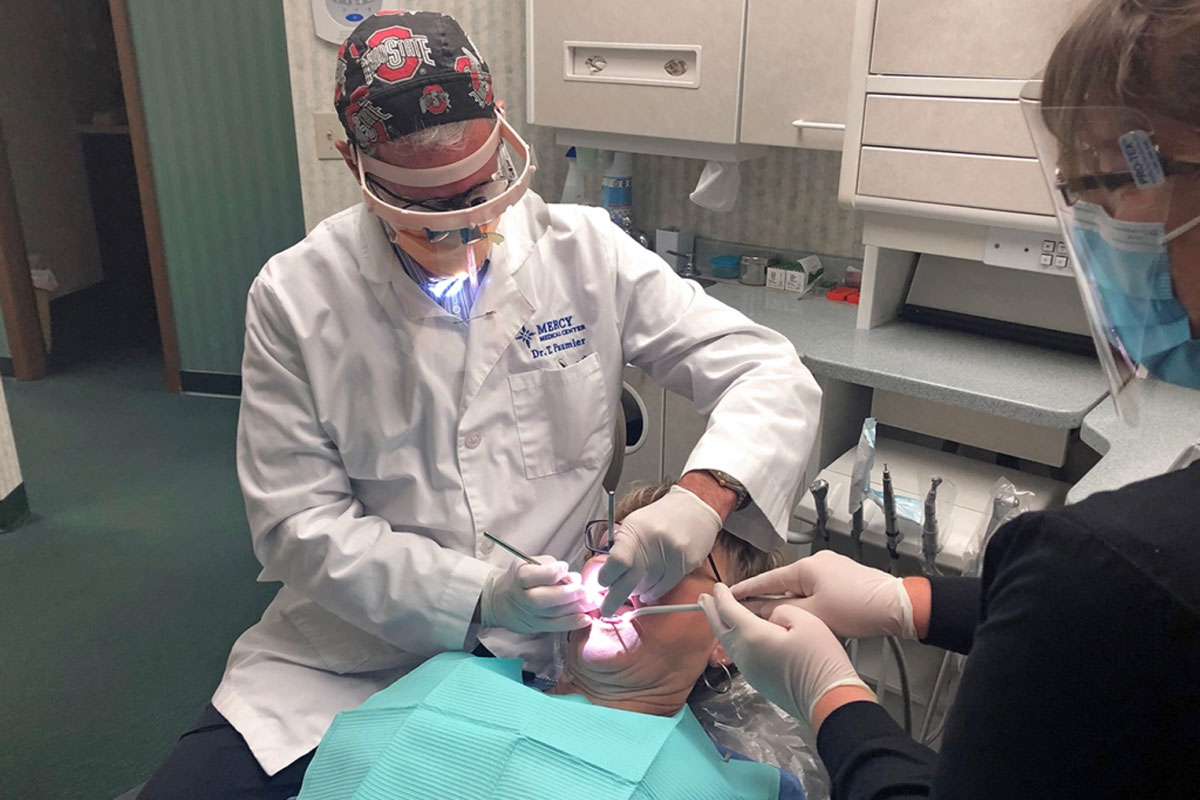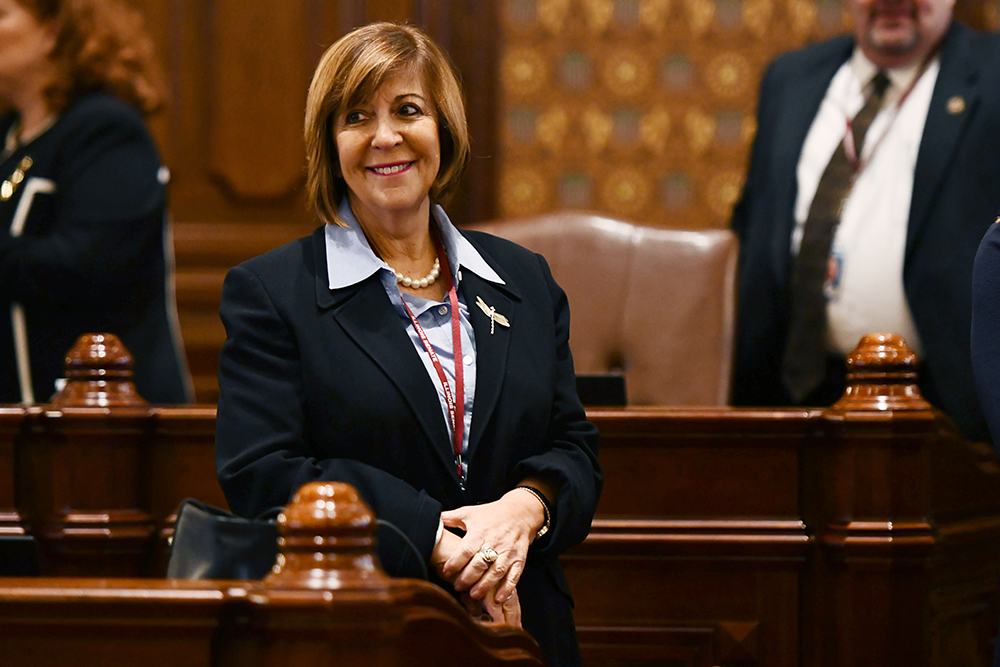- Details
- Category: Senator Sara Feigenholtz News
 SPRINGFIELD – In response to the hard hitting impact of the pandemic, State Senator Sara Feigenholtz (D-Chicago) crafted, sponsored and passed a relief package to provide a lifeline to a struggling industry.
SPRINGFIELD – In response to the hard hitting impact of the pandemic, State Senator Sara Feigenholtz (D-Chicago) crafted, sponsored and passed a relief package to provide a lifeline to a struggling industry.
“In May, we passed a bill allowing cocktail delivery for the bar and restaurant industry, which helped them recoup some of the lost income caused by COVID-19,” Feigenholtz said. “Today we extended this ability to other retail establishments. Alcohol sales make up a large portion of revenue for our eating, drinking and retail establishments."
House Bill 3393, known as the COVID-19 Hospitality Recovery Act, extends the quickly-approaching sunset on cocktail delivery, permits retailers to use credit cards for payment to distributors, and crafts a limited exemption on indirect donations for not-for-profit entities of fixtures and equipment. The package also clarifies laws around permitted delivery.
“These are common sense policies crafted with a great deal of input from industry stakeholders,” Feigenholtz said. “When this legislation becomes law, it will provide restaurants, bars and retailers with additional tools for cash management, as well as flexibility to indirectly accept items such as tents, warmers and other equipment needed to attract customers to outdoor dining.”
The package passed the Senate with unanimous support, and will be sent to the House for a concurrence vote.
- Details
- Category: Senator Sara Feigenholtz News
 CHICAGO – To expand access to dental care, State Senator Sara Feigenholtz (D-Chicago) joined the dental team at Illinois Masonic hospital at a ribbon-cutting ceremony for their new mobile dentistry van. Feigenholtz successfully fought for funding in the state budget to make the new van a reality.
CHICAGO – To expand access to dental care, State Senator Sara Feigenholtz (D-Chicago) joined the dental team at Illinois Masonic hospital at a ribbon-cutting ceremony for their new mobile dentistry van. Feigenholtz successfully fought for funding in the state budget to make the new van a reality.
“Oral hygiene and dental health is an important part of a person’s health care, but often is overlooked,” Feigenholtz said. “Dental visits are often expensive and not always covered by insurance. This new mobile unit will provide comprehensive and affordable dental care to adults and children that have traditionally experienced barriers to care.”
Read more: Feigenholtz partners with dentists of Illinois Masonic for a new mobile van
- Details
- Category: Senator Sara Feigenholtz News
 CHICAGO – August marks 100 years since the 19th Amendment was added to the United States Constitution, granting suffrage to women. State Senator Sara Feigenholtz (D-Chicago), who currently serves as President of the Women’s Network of the National Conference of State Legislatures, moderated an NCSL event today celebrating a century of women’s enfranchisement.
CHICAGO – August marks 100 years since the 19th Amendment was added to the United States Constitution, granting suffrage to women. State Senator Sara Feigenholtz (D-Chicago), who currently serves as President of the Women’s Network of the National Conference of State Legislatures, moderated an NCSL event today celebrating a century of women’s enfranchisement.
“The recognition of the 19th Amendment is arguably one of the most important events in our country’s history, and the hundredth anniversary marks a landmark moment for women,” Feigenholtz said. “It reflects how far we have come and the work that is still ahead.”
Read more: Feigenholtz, NCSL commemorate a century of suffrage
- Details
- Category: Senator Sara Feigenholtz News
 CHICAGO – Earlier this week, the Trump administration announced a plan to deploy agents from the Department of Homeland Security to Chicago to respond to local unrest. State Senator Sara Feigenholtz (D-Chicago) released the following statement:
CHICAGO – Earlier this week, the Trump administration announced a plan to deploy agents from the Department of Homeland Security to Chicago to respond to local unrest. State Senator Sara Feigenholtz (D-Chicago) released the following statement:
“The president continues to wreak havoc and chaos across our country by determining that Homeland Security agents should be sent to Chicago,” Feigenholtz said. “There is no way to identify them, no specific purpose for their deployment, and they have no business coming to our city. The Trump administration’s actions provide nothing more than an endless list of failures since the day this administration began.”
The news comes just days after federal agents were deployed to Portland, Oregon. Quickly, footage of these agents using excessive force on protesters surfaced, leading many to fear similar acts of violence may occur in Chicago.
“If the president is truly concerned about the well-being of Chicago residents, then he should do something to address the public health crisis we’re currently facing instead of risking further serious injuries by sending in federal agents,” Feigenholtz said.
The Trump administration has not released any information about when the deployment of federal agents is scheduled to occur.
- Details
- Category: Senator Sara Feigenholtz News
Feigenholtz: AJ Freund case a reminder that there is still work to be done
 CHICAGO – A judge in McHenry Country sentenced JoAnn Cunningham to 35 years in prison Friday for the murder of AJ Freund, her 5-year-old son. State Senator Sara Feigenholtz (D-Chicago), who established a bipartisan, bicameral working group to address shortfalls in the Department of Children and Family Services in the wake of AJ’s death, stressed the importance of addressing and fixing these issues.
CHICAGO – A judge in McHenry Country sentenced JoAnn Cunningham to 35 years in prison Friday for the murder of AJ Freund, her 5-year-old son. State Senator Sara Feigenholtz (D-Chicago), who established a bipartisan, bicameral working group to address shortfalls in the Department of Children and Family Services in the wake of AJ’s death, stressed the importance of addressing and fixing these issues.
“There is no possible sentence that could provide justice to AJ Freund,” Feigenholtz said. “He was only five years old, and was killed by someone who was supposed to be taking care of him. The unfortunate reality is that until we can address and fix the issues plaguing DCFS, AJ’s story won’t be the last.”
Cunningham killed Freund in April of 2019 in what Judge Robert Wilbrandt described as “inhumane, repulsive and, frankly, shocking” actions. Freund was beaten to death by Cunningham while in their home on April 19, 2019, and was buried in a shallow, unmarked grave by his father, Drew Freund. He was found six days later.
The case shined a light onto the deficiencies in the DCFS system, which Freund and Cunningham were a part of, and prompted Feigenholtz to push for the formation of the working group.
“After I heard the tragic news of AJ’s death, my stance was that we as a legislature need to continue our diligent work so that we can ensure DCFS and its partner agencies have the resources and tools they require to protect all of the children that fall under their care,” Feigenholtz said. “We made some progress, but there is still a long road ahead of us and a lot of work to be done.”
Cunningham faced up to a maximum of 60 years in prison. Under Friday’s sentencing, she is ineligible for parole. Drew Freund is also charged with first-degree murder but has not yet faced trial.
- Details
- Category: Senator Sara Feigenholtz News
 Over 170 people participated, expressing enthusiasm for the Clean Energy Jobs Act
Over 170 people participated, expressing enthusiasm for the Clean Energy Jobs Act
CHICAGO – Today, Illinois State Senator Sara Feigenholtz (D-Chicago) and State Reps. Ann Williams (D-Chicago) and Yoni Pizer (D-Chicago) hosted a virtual town hall about clean energy issues in the time of a pandemic. They were joined by over 170 people and issue experts from partner organizations Citizens Utility Board (CUB) and the Illinois Environmental Council.
Constituents expressed concern over the state’s continued use of fossil fuels, increased air pollution and an exacerbated climate crisis as the novel coronavirus continues to spread in communities across the United States. Participants also expressed overwhelming enthusiasm for the Clean Energy Jobs Act (CEJA, House Bill 3624/Senate Bill 2132), the only comprehensive climate initiative focused on equitable job creation before the Illinois General Assembly.
"Environmental experts have demonstrated the direct link between pandemics and climate change - no longer can we allow the profit over people model,” said CEJA co-sponsor Sen. Feigenholtz. “The time to pass the Clean Energy Jobs Act is now. It is one of the most important pieces of legislation we have before us."
As Illinois grapples with the unprecedented job losses from the COVID-19 pandemic, CEJA would put people back to work without raising taxes or electricity bills. Jobs created by CEJA would be focused especially in communities where workers and small businesses have been hit hardest — predominantly communities of color that have seen disproportionate numbers of COVID-19 cases and deaths, as well as downstate communities left in a lurch by coal plant closures.
“The urgency to pass the Clean Energy Jobs Act could not be clearer as families in our communities are struggling to find work and economic stability, a reality that has only worsened as COVID-19 wreaks havoc on our economy,” said CEJA chief sponsor Rep. Williams. “With equitable job creation at its core, CEJA takes meaningful action on the climate crisis while creating an economic boost and good-paying jobs for those who need it most.”
CEJA would make Illinois a leader in clean energy by moving the state to 100% renewable energy, electrifying the mass transit and transportation sector and cutting carbon from the power sector, all while building four to five times the amount of new clean energy in the state and bring in more than $30 billion in new private investment to Illinois by 2030.
“Even in the midst of a global pandemic, I believe it's important that we continue to build on the progress we've made with clean energy investment in Illinois. The issues of climate change, an over-reliance on fossil fuels, and public health are intricately intertwined. It is clear we need to focus our efforts on building an economy based on renewable energy, ultimately leading to a healthier future. Passing the Clean Energy Jobs Act will be a huge step in this direction,” said CEJA co-sponsor Rep. Pizer.
Participants during the town hall were briefed on the policy mechanisms that make CEJA a nation-leading approach to clean energy and equity, and armed with strategies for helping to get CEJA passed in the coming legislative session.
“Legislators from across the state consistently tell us that they hear from constituents about CEJA as much, and in some cases, more, than any other legislative proposals, which is no surprise to us,” said Gavin Taves, clean energy policy director of the Illinois Environmental Council. “A statewide poll in June found that 82% of Illinoisans support the CEJA.”
“Clean energy is good for our pocketbooks, our economy and our health, and that’s why CUB supports the Clean Energy Jobs Act,” said Sarah Moskowitz, CUB deputy director. “As Illinois seeks to recover from the pandemic and financial crisis, we need strong energy legislation that will protect our electricity bills and spark thousands of clean energy jobs for the communities that need it the most. We look forward to a lively discussion.”
The Illinois Clean Jobs Coalition successfully championed the Future Energy Jobs Act (FEJA), bipartisan legislation that was signed into law in 2016 and has been the biggest clean energy breakthrough in state history. FEJA has brought more renewable energy development and jobs to Illinois, and it has saved Illinoisans more than $300 million through efficiency improvements. The Clean Energy Jobs Act would build off that success.
Both versions of the legislation are pending assignment to a committee in their respective chambers of the General Assembly.
- Details
- Category: Senator Sara Feigenholtz News
 CHICAGO – State Senator Sara Feigenholtz (D-Chicago) railed against the most recent Trump administration decision to identify international students who are attending universities with online-only learning and require them to leave the United States or not allow them to enter the country at all.
CHICAGO – State Senator Sara Feigenholtz (D-Chicago) railed against the most recent Trump administration decision to identify international students who are attending universities with online-only learning and require them to leave the United States or not allow them to enter the country at all.
“This is yet another example of the xenophobic policies advanced by Donald Trump’s administration, and this time his targets are colleges, universities and international exchange students.,” said Feigenholtz, whose district includes DePaul University.
If enacted, this decision could affect more than a million international students who come to the United States to attend universities or participate in other training programs.
On Monday, Immigration and Customs Enforcement announced that international students pursuing degrees in the United States will be required to leave the country or risk deportation if their schools conduct only online courses in the fall.
ICE further stated that the U.S. Department of State would not issue visas to students enrolled in fully-online programs for the fall semester.
"Harvard University and MIT sued the Trump administration Wednesday over the guidance, and I am hoping Illinois colleges and universities will join them. Enough is enough,” Feigenholtz added. “International students are an important part of campus communities, and it’s discriminatory to require them to leave the United States.”
- Details
- Category: Senator Sara Feigenholtz News
 CHICAGO – State Senator Sara Feigenholtz (D-Chicago) is highlighting a new grant program to assist small bars and restaurants that have been affected by the COVID-19 pandemic.
CHICAGO – State Senator Sara Feigenholtz (D-Chicago) is highlighting a new grant program to assist small bars and restaurants that have been affected by the COVID-19 pandemic.
“Our local bars and restaurants are among the businesses that have been hit hardest by the COVID-19 crisis, and if we don’t find ways to support them, many will have to close their doors permanently,” Feigenholtz said. “These grants are another means to help them stay on their feet.”
The Illinois Department of Commerce and Economic Opportunity is providing 1,000 grants for small bars and restaurants worth a total of $20 million as part of the state’s Business Interruption Grants program.
The funds are intended to help these small businesses survive the COVID-19 pandemic, help offset the costs they’ve incurred during months of shut down or restricted operations, and ensure they have the resources they need to reopen safely in the coming months.
To be eligible for a grant, bars and restaurants must have made under $3 million in revenue in 2019, or a pro-rated amount if they have been in business less than a year, and have been operating for at least three months prior to March 2020. Only businesses who have been unable to provide outdoor food and beverage service during Phase 3 will be eligible.
The amount awarded will be $20,000 for businesses earning $2-3 million in revenue for 2019 and $15,000 for those earning less than $2 million.
Half of the grants distributed will be for businesses in disproportionately impacted areas, with priority given to areas with recent property damage.
“This program may not solve all the issues bars and restaurants are facing right now, but it’s another good step we can take to help protect them from the financial challenges posed by the pandemic,” Feigenholtz said. “I encourage all eligible bar and restaurant owners to apply.”
Similar grant programs are available for barbershops, salons, and fitness centers, as well as for businesses in disproportionately impacted areas with recent significant property damage.
Grant applications will be made available by DCEO Monday, June 22.
More Articles …
Page 12 of 13













 © 2026 Illinois Senate Democratic Caucus
© 2026 Illinois Senate Democratic Caucus